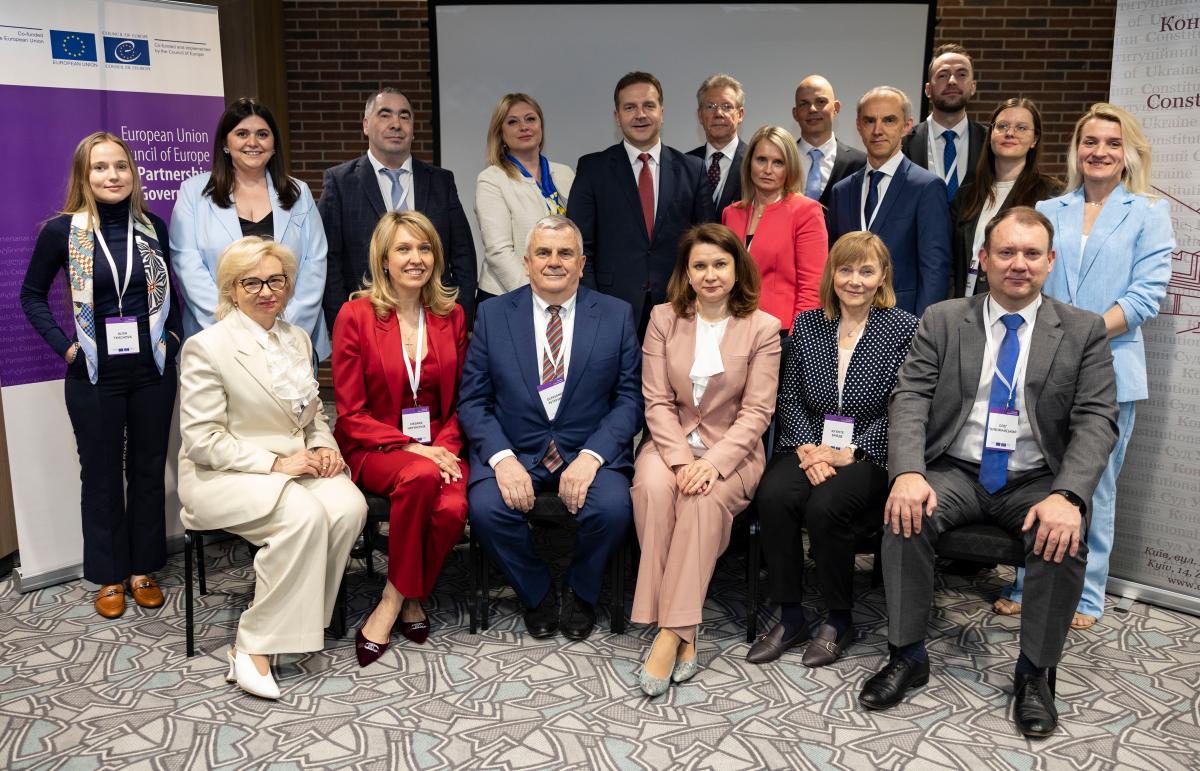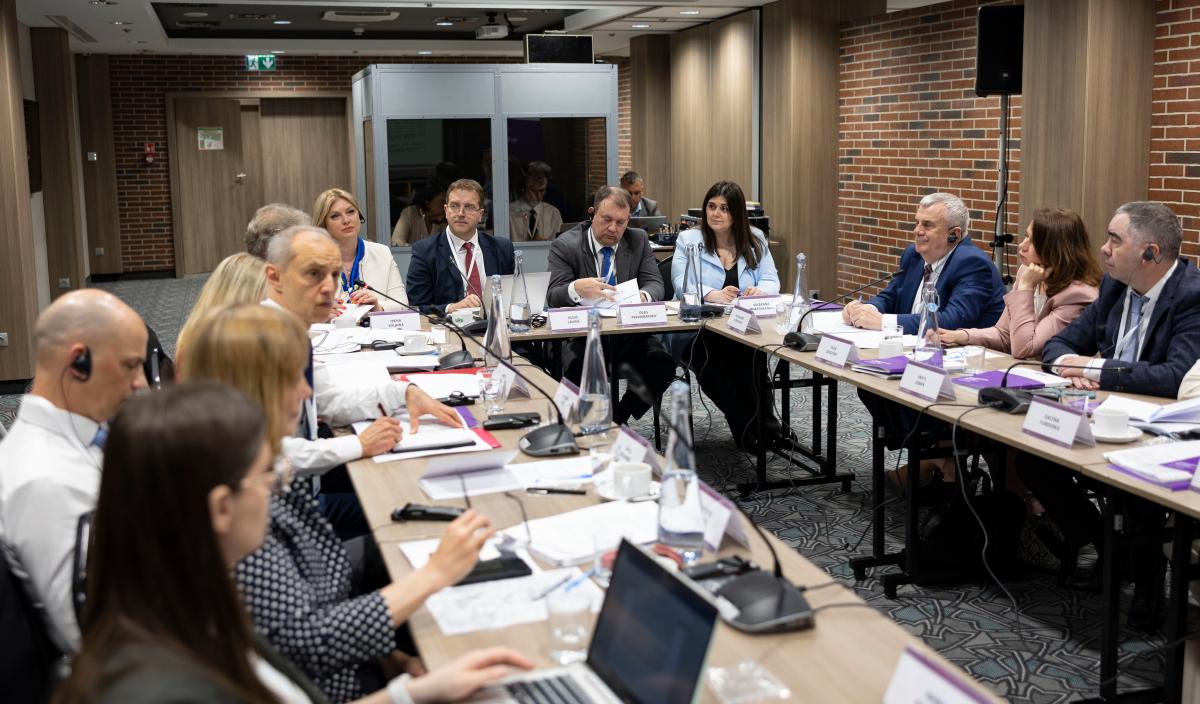The judges of the Constitutional Court of Ukraine Oksana Hryshchuk, Vasyl Lemak, Oleh Pervomaiskyi, Oleksandr Petryshyn, Olga Sovgyria, and Galyna Yurovska participated in a round table discussion with their colleagues from the Constitutional Court of the Republic of Latvia on the use of the right to file a constitutional complaint and delivered thematic reports.
The Constitutional Court of the Republic of Latvia was represented by the President of the Court Aldis Laviņš, Vice President of the Court Irēna Kucina, judges of the Court Gunārs Kusiņš, Jānis Neimanis, Artūrs Kučs, Anita Rodiņa, Jautrīte Briede.
This event is organised by the Project “Support to development of the constitutional justice in Ukraine”, implemented within the framework of the European Union and the Council of Europe Joint Programme “Partnership for Good Governance”, Phase III (hereinafter, the “Project”) and was held in Kraków, Republic of Poland, on 9-10 May 9–10, 2024.
The Council of Europe was represented at the event by Project Manager Siuzanna Mnatsakanian and Project Assistant Alisa Tkachova.
During the round table, the judges held a series of sessions to discuss the systems of functioning of the constitutional review bodies of Ukraine and Republic of Latvia; the content and forms of the right to a constitutional complaint; recommendations for the consideration of constitutional complaints in the light of Ukraine's path to the EU; and further cooperation between the Constitutional Courts of both countries.
During the opening of the event, the President of the Constitutional Court of the Republic of Latvia, Aldis Laviņš, and the judge of the Constitutional Court of Ukraine, Oleh Pervomaiskyi, delivered welcoming remarks.
Oleh Pervomaiskyi noted that since the beginning of russia's military aggression against Ukraine, the promotion of human rights has become even more important. “We are extremely pleased that owing to the joint Project of the Council of Europe and the Constitutional Court of Ukraine, we can deepen our cooperation with our Latvian colleagues and exchange experience at the bilateral level,” the judge underscored. He also noted that the legal positions applied in the decisions of the Constitutional Court of the Republic of Latvia are often used in the decisions of the constitutional review body of Ukraine. Therefore, such professional meetings with international colleagues are very useful and fruitful.
The judge of the Constitutional Court of Ukraine Oleksandr Petryshyn delivered a report «”Normative” constitutional individual complaint in Ukraine».
He spoke about the prerequisites for the introduction of the institution of constitutional complaint in Ukraine, noting that the norms of the Constitution of Ukraine introduced the institution of constitutional complaint for the first time in the history of national constitutionalism, which was aimed not only at protecting individual constitutional rights, but also at reducing the number of applications to the ECHR. The judge focused on the issues that arise in the process of deliberation of constitutional complaints and after the Court's decision delivery in cases upon constitutional complaints and that need to be addressed. He emphasised the need to further improve the institution of constitutional complaint to increase its effectiveness in protecting human rights. According to him, a full constitutional complaint can become the most effective tool for the protection of human rights and an integral element of the Ukrainian legal system.
The judge of the Constitutional Court of Ukraine Olga Sovgyria, delivered a report on “Finality of a court decision as the condition for admissibility of a constitutional individual complaint: interpretation through the prism of the in dubio pro homine principle”.
She focused on the requirements to the content of the constitutional complaint and the procedure for its filing. The judge noted that the Law of Ukraine “On the Constitutional Court of Ukraine” stipulates that a constitutional complaint is admissible if it meets the formal requirements for the content of a constitutional complaint, and if: all national remedies have been exhausted and no more than three months have elapsed since the final court decision applying the law of Ukraine (its individual provisions) entered into force. Failure to comply with these requirements is a formal ground for declaring a constitutional complaint inadmissible. In this context, the judge underlined that the CCU had changed its practice of refusing to initiate constitutional proceedings in a case only on formal grounds, such as failure to provide copies of legal acts or certification of a copy of a final court decision by the wrong court to deliver it.
Olga Sovgyria highlighted that the finality of a court decision is an important condition for the admissibility of a constitutional complaint, which is defined at the level of the Constitution of Ukraine. The judge drew attention to the importance of interpreting the finality of a court decision through the prism of the in dubio pro homine principle, which means “when in substantial doubt – in favour of the person” and provides that in disputed situations, courts should try to choose the interpretation of the law that best protects the rights and interests of the individual.
The judge of the Constitutional Court of Ukraine Vasyl Lemak, delivered a report “Restrictions on human rights in times of war: where is the boundary? (experience of Ukraine)“.
In his speech, the judge, in particular, outlined the criteria for restrictions on human rights in times of war (other emergency), described the doctrine and international practice, and delineated the understanding of the permissibility of restrictions on human rights in Article 64.2 of the Constitution of Ukraine. Vasyl Lemak emphasised that the main limitation of restrictions on human rights and freedoms is the constitutional purpose of such restrictions, i.e. the purpose of the restriction as defined in the constitutional text. The issue is not only in the verbal constructions that link restrictions to certain constitutional provisions, but also in the conceptual and logical connection between them. On the other hand, this means that the so-called legitimate purpose of state intervention cannot be derived in general from the public interest, from the way it is understood by the legislator or other bodies of state power.
According to the judge, most of the human rights guaranteed by the Constitution of Ukraine are not only subjective rights in the public sphere, but also objectively expressed principles enshrined in the Constitution of Ukraine. Therefore, the judge noted, when assessing interference with them according to the well-known methods of proportionality and preservation of the essence of human right, the question should be answered first of all whether they do not violate the expressis verbis provisions of the Constitution of Ukraine. This is the ultimate threshold that cannot be crossed, if we remember the mission of constitutional proceedings – to protect the Constitution, even in times of war.
During the roundtable, judges of the Constitutional Court of the Republic of Latvia Gunārs Kusiņš, Anita Rodiņa, and Artūrs Kučs also delivered their reports.
The judges of the Constitutional Court of Ukraine commended the international partners and Latvian colleagues for their consistent support and the opportunity to exchange professional experience, learn about the best international practices to be applied in their work.





